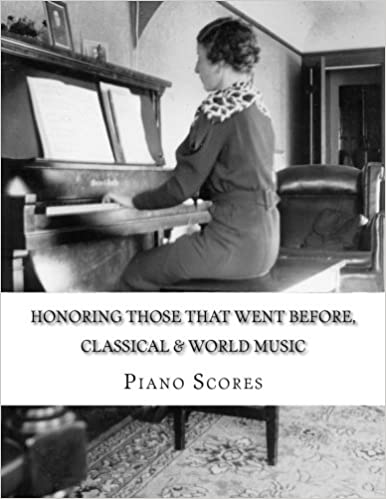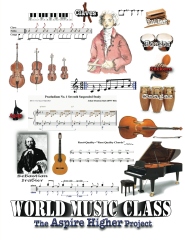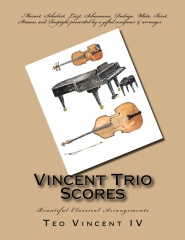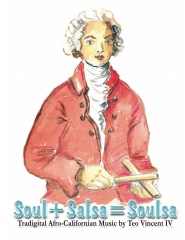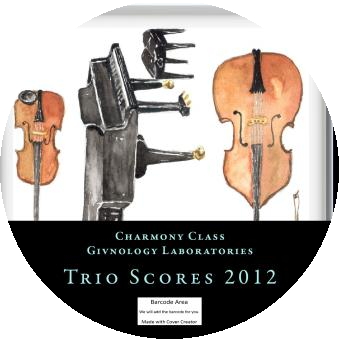Pages 12-58 below at the end of this page!
Click the book's icon above to view detail information in Amazon.com where they are available for purchase.
Givnology & Teo Vincent IV share the joy of keeping music & cultures alive.

Espressivo Brillante! Music's expressions!
The incredible joy of knowing music, how it is made, how it is written, and how it is played, enriches our lives in so many timeless and priceless ways.
How artists share their experiences with us, across time, languages and cultures, is no less than magic. Helping youth, or even young-at-heart people to experience the magic of music is a great ability to share.
Music can set a tone, give you strength to stay focused and overcome challenges, impart deepest feeling, inspire greatness and bring back the most beautiful of memories, all in a flash!
You (and your ears) are your best teacher! Make your musical journey a fun exciting trip and you will have countless hours enjoying it.
From the free eBook "Life of Chopin by Franz Liszt" here: http://www.gutenberg.org/ebooks/4386
"If it has been often proved that "no one is a prophet in his own country;" is it not equally true that the prophets, the men of the future, who feel its life in advance, and prefigure it in their works, are never recognized as prophets in their own times? It would be presumptuous to assert that it can ever be otherwise. In vain may the young generations of artists protest against the "Anti-progressives," whose invariable custom it is to assault and beat down the living with the dead: time alone can test the real value, or reveal the hidden beauties, either of musical compositions, or of kindred efforts in the sister arts.
As the manifold forms of art are but different incantations, charged with electricity from the soul of the artist, and destined to evoke the latent emotions and passions in order to render them sensible, intelligible, and, in some degree, tangible; so genius may be manifested in the invention of new forms, adapted, it may be, to the expression of feelings which have not yet surged within the limits of common experience, and are indeed first evoked within the magic circle by the creative power of artistic intuition. In arts in which sensation is linked to emotion, without the intermediate assistance of thought and reflection, the mere introduction of unaccustomed forms, of unused modes, must present an obstacle to the immediate comprehension of any very original composition. The surprise, nay, the fatigue, caused by the novelty of the singular impressions which it awakens, will make it appear to many as if written in a language of which they were ignorant, and which that reason will in itself be sufficient to induce them to pronounce a barbarous dialect. The trouble of accustoming the ear to it will repel many who will, in consequence, refuse to make a study of it. Through the more vivid and youthful organizations, less enthralled by the chains of habit; through the more ardent spirits, won first by curiosity, then filled with passion for the new idiom, must it penetrate and win the resisting and opposing public, which will finally catch the meaning, the aim, the construction, and at last render justice to its qualities, and acknowledge whatever beauty it may contain. Musicians who do not restrict themselves within the limits of conventional routine, have, consequently, more need than other artists of the aid of time. They cannot hope that death will bring that instantaneous plus-value to their works which it gives to those of the painters. No musician could renew, to the profit of his manuscripts, the deception practiced by one of the great Flemish painters, who, wishing in his lifetime to benefit by his future glory, directed his wife to spread abroad the news of his death, in order that the pictures with which he had taken care to cover the walls of his studio, might suddenly increase in value!
Whatever may be the present popularity of any part of the productions of one, broken, by suffering long before taken by death, it is nevertheless to be presumed that posterity will award to his works an estimation of a far higher character, of a much more earnest nature, than has hitherto been awarded them. "
Later in the same book:
"He knew that he did not act upon the masses, that he could not warm the multitude, which is like a sea of lead, and as heavy to set in motion, and which, though its waves may be melted and rendered malleable by heat, requires the powerful arm of an athletic Cyclops to manipulate, fuse, and pour into moulds, where the dull metal, glowing and seething under the electric fire, becomes thought and feeling under the new form into which it has been forced." - Franz Liszt in Life Of Chopin (http://www.gutenberg.org/ebooks/4386)
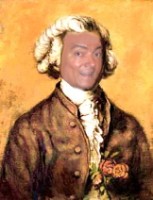
Teo Vincent IV has borrowed The Black Mozart's wig and jacket.
Below is from World Music Class book above
There are many feelings that can’t be expressed in words but music is the perfect medium to get the listener involved. Music can set a tone, give you strength to stay focused and overcome challenges, impart deepest feeling, inspire greatness and bring back the most beautiful of memories, all in a flash!
Music is the Universal Language
The Universal Language of Music owes a debt of gratitude to its greatest writers. Ludwig van Beethoven (1770-1827) may have had more emotional experiences than we would ever wish for. The longing of Frédéric François Chopin (1810-1849) for his dear Poland was more than one could bear. He cried into his piano each night, and the tears become sparkles of brilliance, uplifting grace and transcendence.
Let your ears be your guides, your teachers, and even your refuge. Thank you so dearly, great masters, for sharing your notes, your emotings and emotions…
Use stories of the great composers (and performers) to learn how to be more successful as a composer 
 (or performer) in this world, here and now. Follow the best examples of composer’s achievements.
(or performer) in this world, here and now. Follow the best examples of composer’s achievements.
Franz Liszt (1811-1886) was very well connected. He used his influence and was a great benefactor to other composers such as Robert Alexander Schumann (1810-1856), Hector Berlioz, (1803-1869), Wilhelm Richard Wagner (1813-1883), Joseph-Maurice Ravel (1875-1937), Chopin, Debussy and others.
Liszt was known to not only teach many great musicians for free, but helped so many financially! He did benefits for a Beethoven statue, and he also transcribed Beethoven’s 9 symphonies for piano. This was no easy task because there were none of the technologies we have available nowadays!
Chopin and Liszt dedicated many great songs and studies to each other. Liszt brought gypsy music to the classical stage, as well as many other things he invented, pioneered and used his vision to share with us
Brahms created many great orchestral versions of wonderful folk music. His Hungarian Dances are amazing! Many great composers took the time and effort to take folk musics, even gypsy musics and write them down – as difficult as that must have been, writing down the special techniques that folk musicians have.
Beware some of the things that Schubert did that weren’t good for his musical future. You could say he simply ran with the wrong crowd. Still, let us be inspired by the way he composed so much beautiful music even having come from abject poverty!
Not one of Schubert’s symphonies was played in his lifetime, and they are some of the most well loved symphonies of all time. Thank you dearly Franz Schubert for sharing your beautiful music with us all!
Another amazing musician who came from poverty was Antonio Salieri (1750-1825).
The well-known movie Amadeus paints a wrong picture. It portrays Wolfgang Amadeus Mozart (1756-1791) as a brat and Salieri as his murderer. Both of those fictional depictions are the farthest you can get from the truth – and extremely insulting to two musical giants, geniuses who haven’t been outdone on this planet ever since!
Sure it is sad to know that Mozart in his 35 years could have done more if he had lived longer. But on the other hand look at this: All the symphonies, concertos, sonatas, operas, and many other forms that he produced, these were all in his own hand! Think how many pages every day he must have produced.
Mozart was so prolific and amazing that even in that short time he has produced so much music that in many ways he still has no equal or superior.
In reality Salieri and Mozart were brothers in the Masonic lodge. There was one performance where Mozart had a stage on one side of the room, Salieri a stage on the other side. The audience literally turned their chairs around to hear the other one’s opera! Salieri and Mozart composed a cantata for voice and piano together: “Per la ricuperata salute di Ophelia”. These were obviously two comrades who surely did many things to help each other, even with a bitter rivalry because both thought themselves the greatest composer.
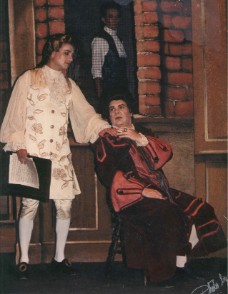
Mozart and Salieri, friends, collaborators and rivals
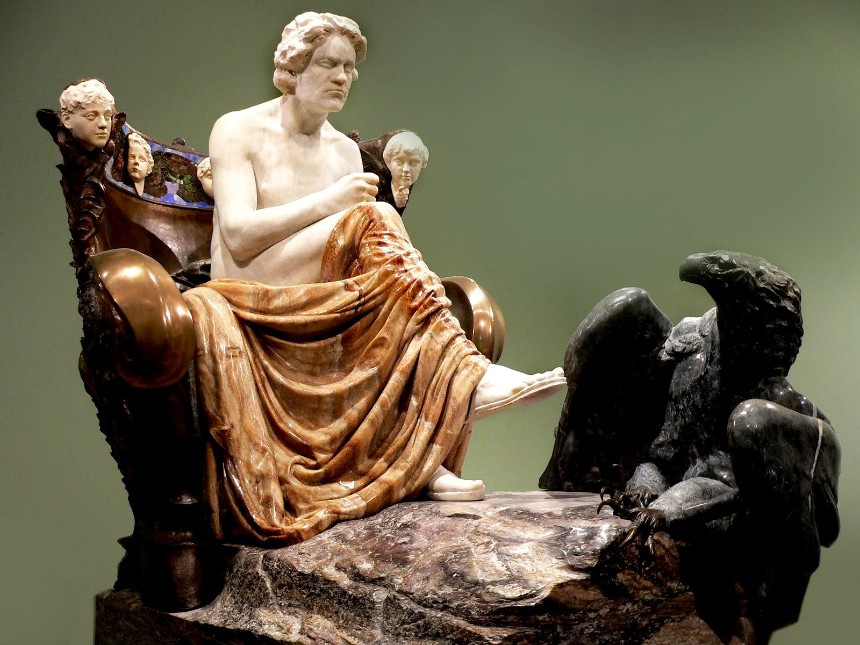
Guess who that robed person is! The answer at the bottom of the page.
